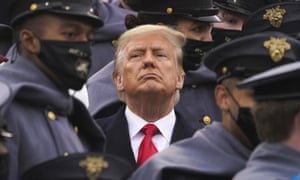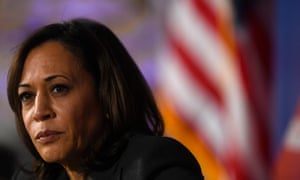Extract from The Guardian

Surrounded by Army cadets, Donald Trump watches the first half of the 121st Army-Navy Football Game at West Point earlier this month. Photograph: Andrew Harnik/AP
Legal threats range from investigations into his business dealings in New York to possible obstruction of justice charges – but all come with a political cost
by Ed Pilkington in New York
At noon on 20 January, presuming he doesn’t have to be dragged out of the White House as a trespasser, Donald Trump will make one last walk across the South Lawn, take his seat inside Marine One, and be gone.
From that moment, Trump’s rambunctious term as president of the United States will be over. But in one important aspect, the challenge presented by his presidency will have only just begun: the possibility that he will face prosecution for crimes committed before he took office or while in the Oval Office.
“You’ve never had a president before who has invited so much scrutiny,” said Bob Bauer, White House counsel under Barack Obama. “This has been a very eventful presidency that raises hard questions about what happens when Trump leaves office.”
For the past four years Trump has been shielded from legal jeopardy by a justice department memo that rules out criminal prosecution of a sitting president. But the second he boards that presidential helicopter and fades into the horizon, all bets are off.
The Manhattan district attorney, Cyrus Vance, is actively investigating Trump’s business dealings. The focus described in court documents is “extensive and protracted criminal conduct at the Trump Organization” including possible bank fraud.
The government is going to have decisions to make about how to respond
A second major investigation by the fearsome federal prosecutors of the southern district of New York has already led to the conviction of Trump’s former lawyer Michael Cohen. He pleaded guilty to campaign finance violations relating to the “hush money” paid to Stormy Daniels, the adult film actor who alleged an affair with Trump during the 2016 presidential campaign.
During the course of the prosecution, Cohen implicated a certain “Individual 1” – Trump – as the mastermind behind the felony. Though the investigation was technically closed last year, charges could be revisited once Trump’s effective immunity is lifted.
It all points to a momentous and fiendishly difficult legal challenge, fraught with political danger for the incoming Biden administration. Should Trump be investigated and possibly prosecuted for crimes committed before and during his presidency?

Any attempt to hold Trump criminally liable in a federal prosecution would be a first in US history. No exiting president has ever been pursued in such a way by his successor (Richard Nixon was spared the ordeal by Gerald Ford’s contentious presidential pardon).
Previous presidents have tended to take the view that it is better to look forwards in the name of national healing than backwards at the failings of their predecessor. And for good reasons – any prosecution would probably be long and difficult, act as a huge distraction, and expose the incoming president to accusations that they were acting like a tinpot dictator hounding their political enemy.
If you do nothing you are saying that though the president of the United States is not above the law, in fact he is
That a possible Trump prosecution is being discussed at all is a sign of the exceptional nature of the past four years. Those who argue in favor of legal action accept that there are powerful objections to going after Trump but urge people to think about the alternative – the dangers of inaction.
As head of one of the three main teams answering to the special counsel Robert Mueller, Weissmann had a ringside seat on what he calls Trump’s “lawless White House”. In his new book, Where Law Ends, he argues that the prevailing view of the 45th president is that “following the rules is optional and that breaking them comes at minimal, if not zero, cost”.
Weissmann told the Guardian that there would be a price to be paid if that attitude went unchallenged once Trump leaves office. “One of the things we learnt from this presidency was that our system of checks and balances is not as strong as we thought, and that would be exacerbated by not holding him to account.”

“And so the president is immune coming and going, and I think that would be very difficult to square with the idea that he or she is not above the law.”
Biden has made clear his lack of enthusiasm for prosecuting Trump, saying it would be “probably not very good for democracy”. But he has also made clear that he would leave the decision to his appointed attorney general, following the norm of justice department independence that Trump has repeatedly shattered.
Other prominent Democrats have taken a more bullish position, adding pressure on the incoming attorney general to be aggressive. During the Democratic primary debates, Elizabeth Warren called for an independent taskforce to be set up to investigate any Trump corruption or other criminal acts in office.
Kamala Harris also took a stance that may come to haunt the new administration. The vice president-elect, asked by NPR last year whether she would want to see charges brought by the Department of Justice, replied: “I believe that they would have no choice and that they should, yes.”
Trump issued a series of pardons largely characterized by political self-interest
There are several possible ways in which the justice department could be forced to confront the issue of whether or not to take on Trump. One would be through a revelation as yet unknown, following the emergence of new information.
Weissmann points out that the Biden administration will have access to a wealth of documents that were previously withheld from Congress during the impeachment inquiry, including intelligence agency and state department files. Official communications sent by Jared Kushner and Ivanka Trump through their personal emails and messaging apps – an ironic move given the flak Hillary Clinton endured from the Trump family in 2016 for using her personal email server – may also become available for scrutiny.
But the two most likely avenues for the pursuit of any criminal investigation would relate to Trump’s use of his presidential pardon power and alleged obstruction of justice. “Trump issued a series of pardons largely characterized by political self-interest,” Weissmann said.

For Weissmann, the way Trump continually teased his associates – including Roger Stone and Paul Manafort – with the promise of pardons in the middle of federal prosecutions was especially egregious. “There may be a legitimate reason to give somebody a pardon, but what’s the legitimate reason for dangling a pardon other than to thwart that person from cooperating with the government?”
Perhaps the most solid evidence of criminal wrongdoing compiled against Trump concerns obstruction of justice. John Bolton, the former national security adviser, went so far as to say that for Trump, obstruction of justice to further his own political interests was a “way of life”.
In his final report on the Russia investigation, Mueller laid out 10 examples of Trump’s behavior that could be legally construed as obstruction. Though Mueller declined to say whether they met the standard for charges – the US attorney general, Bill Barr, suggested they did not, but gave no explanation for his thinking – he did leave them in plain sight for any future federal prosecutor to revisit.
In one of the starkest of those incidents, Trump tried to scupper the special counsel inquiry itself by ordering his White House counsel, Don McGahn, to fire Mueller. When that became public he compounded the abuse by ordering McGahn to deny the truth in an attempt at cover-up.
Weissmann, who played a key role in gathering the evidence against Trump in the Mueller report, said that such obstruction goes to the heart of why Trump should face prosecution.
“When the president, no matter who it is, obstructs a special counsel investigation there have to be consequences. If you can obstruct an investigation criminally but you don’t have to worry about ever being prosecuted, well then, there’s no point in ever appointing a special counsel.”
No comments:
Post a Comment